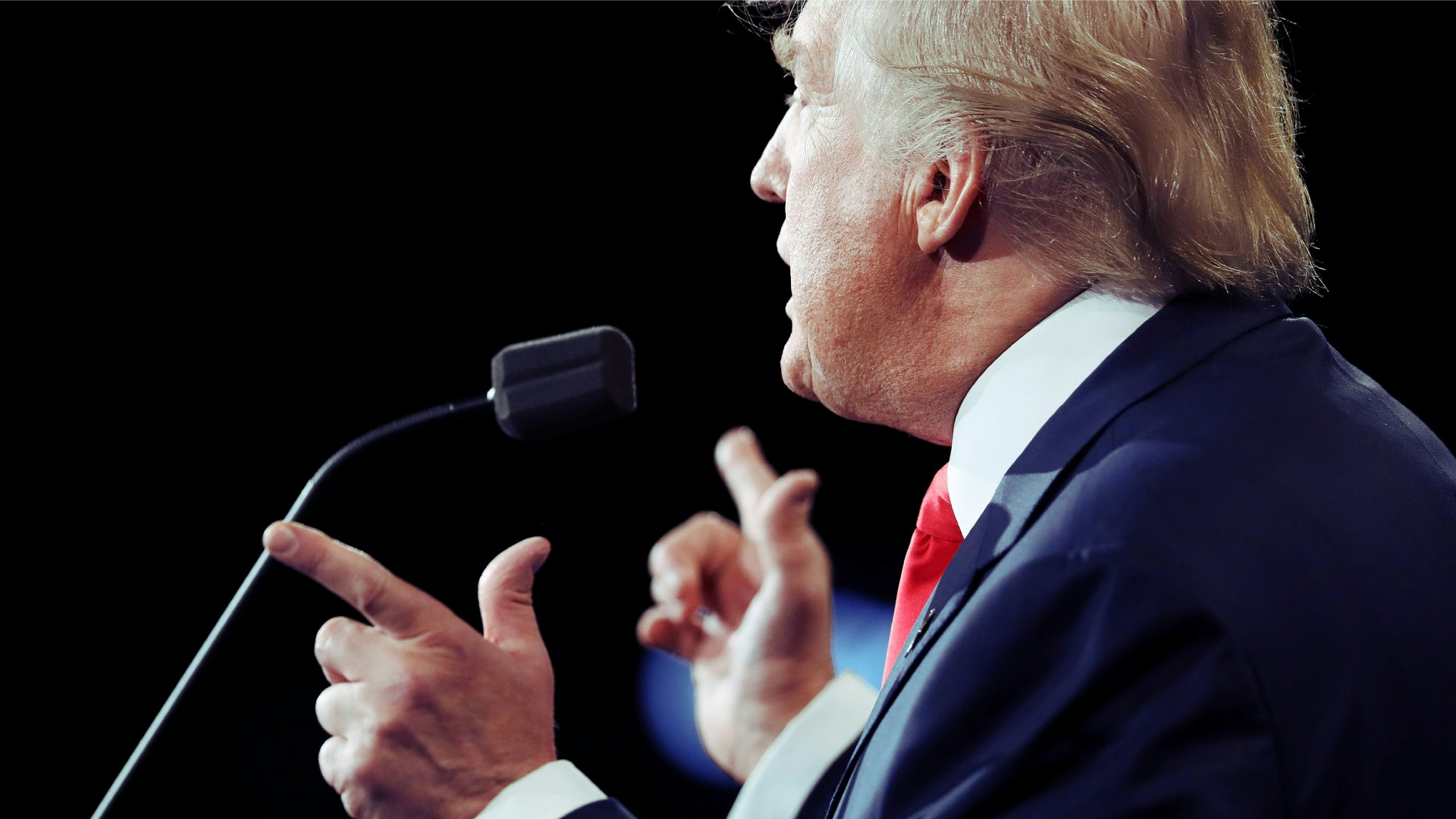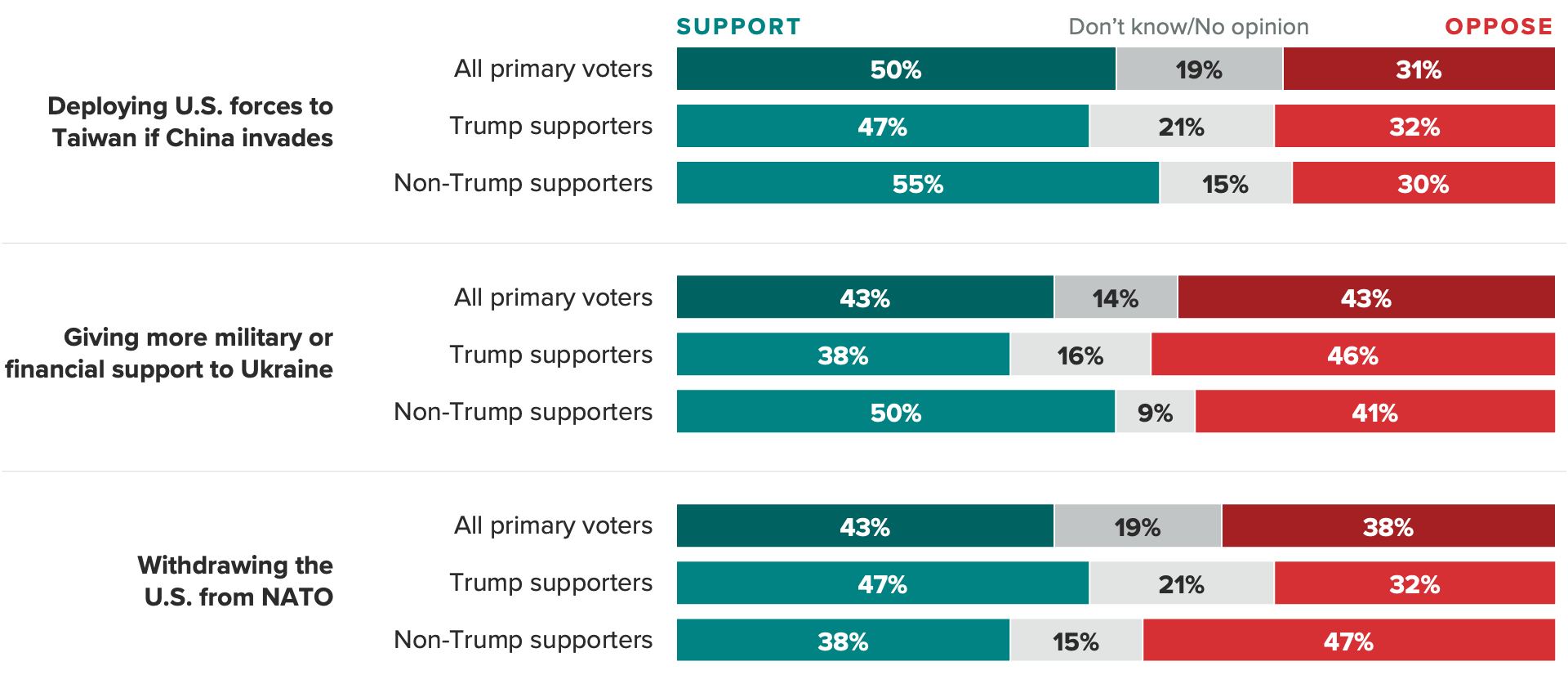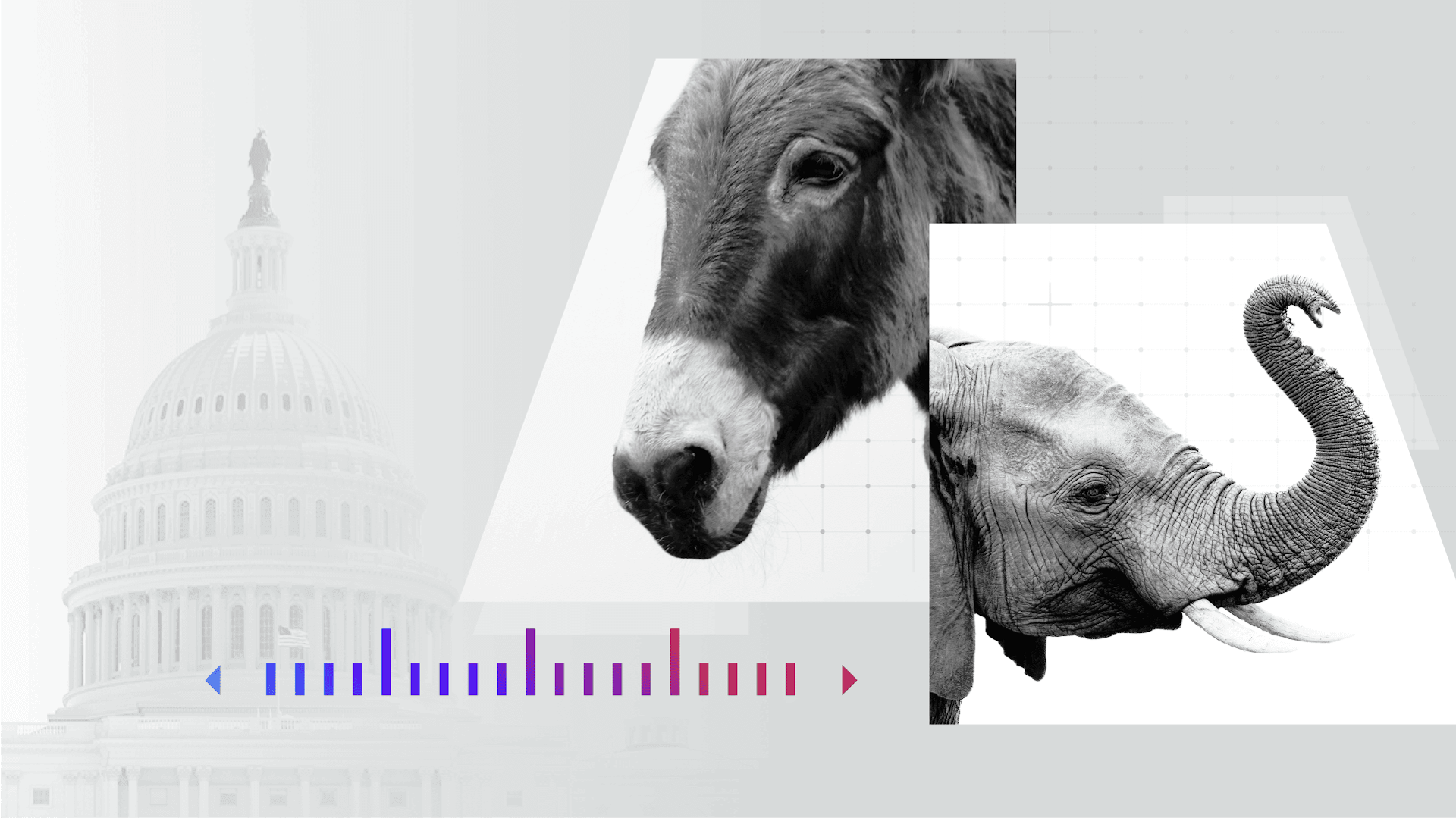GOP Voters Expect Trump to Perform Best in the First Debate — if He Participates

Key Takeaways
Nearly 3 in 5 potential primary voters think Donald Trump would perform best on the debate stage should he participate. But if he skips the Wednesday matchup, nearly a third of the GOP’s prospective electorate expects Vivek Ramaswamy to be the best debater (32%), followed closely by 31% who said Ron DeSantis.
While potential primary voters of all stripes want the candidates to discuss the economy, spending and taxes, those who aren’t supporting Trump are about half as likely as the former president’s backers to want to hear talk about the GOP front-runner (21% versus 40%). There are also Trumpian gaps of interest on issues such as immigration and election integrity.
Most potential Republican primary voters support pardoning Trump of federal crimes if he is convicted, restricting transgender rights and a national ban on abortion after 15 weeks. The expected GOP electorate is divided on continued support for Ukraine and mostly opposes raising the Social Security retirement age.
Potential primary voters largely think the Republican National Committee’s rules for participation are fair. Specifically, 2 in 3 potential primary voters approve of the RNC’s requirement that candidates meet a 1% polling threshold, and 54% support its rule that they receive donations from at least 40,000 individual donors prior to the first debate.
Sign up to get the latest data and analysis on how business, politics and economics intersect around the world.
Who the GOP’s primary voters expect to win the debate
There are high expectations for former President Donald Trump should the current front-runner decide to participate in the first Republican presidential debate in Milwaukee. But if he skips the Aug. 23 showdown, as The New York Times reported Friday he would, potential GOP voters expect entrepreneur Vivek Ramaswamy — who’s sitting in third place in our daily tracking of the contest — to perform best on the debate stage, followed closely by Florida Gov. Ron DeSantis.
GOP Primary Voters Expect Trump and Ramaswamy to Be the Best Debaters
According to our Aug. 10-13 survey, nearly 3 in 5 potential primary voters think Trump would perform best on the debate stage should he participate, followed by 14% who said entrepreneur Vivek Ramaswamy and 11% who said Florida Gov. Ron DeSantis.
But if Trump doesn’t participate, nearly a third of the GOP’s prospective electorate expects Ramaswamy to be the best debater (32%), followed by 31% who said DeSantis.
Just 4% of potential Republican primary voters think former New Jersey Gov. Chris Christie, who has frequently taunted Trump on the campaign trail, would perform best if the former president doesn't participate. This is similar to the shares who said the same of former U.N. Ambassador Nikki Haley and South Carolina Sen. Tim Scott.
This is daily data: We survey thousands of U.S. voters every day, producing exclusive daily tracking among thousands of Republican primary voters ahead of Election Day.
Understand true impact in real time: Other, more traditional polls with smaller sample sizes may look noisy or show jumps in support. Our dedication to high-frequency survey research means larger sample sizes of voters and demographics, with more consistency and more stability. Daily data matters.
As expectations for the matchup have remained in flux due to Trump’s refusal to say whether he’ll participate, about 2 in 5 potential Republican primary voters said they plan to watch the debate in full, even though nearly half describe it as “very important.”
What the GOP’s voters want the candidates to discuss at the debate
Trump has dominated conversations about the Republican Party’s presidential primary given his massive lead and penchant for controversy, which has taken on a dark and more serious tone following his lies about the 2020 election outcome, the Jan. 6 Capitol riots and his multiple indictments.
However, very few potential Republican primary voters want to hear the candidates talk about themselves (11%) or each other (4%). Instead, a strong 77% majority said the candidates should focus on the issues.
Trump’s Backers Want Candidates to Discuss Immigration, Election Integrity in the Debate
The kitchen table issues are uniting: Roughly 4 in 5 potential Republican primary voters want the candidates to talk about the economy, regardless of whether they support Trump or someone else. More than 7 in 10 want to hear about core GOP issues such as government spending and taxes.
But Trumpian gaps emerge on key topics. For example, Trump supporters are 10 percentage points more likely to want to hear about immigration than prospective primary voters who support someone else. They’re also around 13 points more likely than non-Trump supporters to want to hear the candidates discuss election integrity or fighting “woke” ideology in the United States.
Notably, potential primary voters who don’t support Trump are about half as likely as the former president's backers (21% versus 40%) to want to hear talk about Trump himself. However, the bulk of the Republican electorate agrees on one thing regarding Trump: The former president should be pardoned if he’s convicted of federal crimes.
Potential GOP Primary Voters Still Want to Build the Wall
Nearly 7 in 10 potential GOP primary voters — including 82% of Trump’s backers and 51% of those supporting someone else — said they would support such a pardon. That level of support is similar to the shares who back a 15-week federal abortion ban and restricting gender-affirming care for minors — key pieces of the GOP’s war against “wokeness.”
While Trump’s supporters are more likely to back a pardon for the front-runner than those who aren’t supporting him, the non-Trump backers offer the predominant support for another issue that’s dividing the GOP in Washington: whether to keep helping Ukraine.
Non-Trump Backers Drive the GOP Electorate’s Support for Global Intervention

The GOP’s expected electorate is split at 43% about whether to provide additional military or financial support to Ukraine in its fight against Russia. Trump’s supporters are more likely than not to oppose giving more aid to Ukraine (46% to 38%), while the bulk of those who don’t support the former president back such assistance (50%).
Where the GOP’s electorate stands on debate rules
To qualify for the Aug. 23 debate, the RNC is requiring candidates to reach 1% in a combination of state and/or national polls, receive donations from 40,000 unique donors, and pledge to support the eventual nominee and only participate in RNC-sanctioned debates.
The bulk of the GOP’s prospective electorate (57%) said those rules, packaged together, are fair. Only 13% said they are too strict, even though some lower-polling candidates have complained about the donor threshold.
Specifically, our survey found that large shares of Republicans are on board with the polling requirement, which is set to increase to 3% for the second debate on Sept. 27.
The Potential GOP Electorate Largely Supports the RNC’s Debate Qualification Rules
Two-thirds of potential primary voters approve of the RNC’s decision to require qualifying candidates to meet its 1% polling threshold, only slightly higher than the 63% who support the stricter 3% requirement for the September debate. There’s also a small dip in support for the RNC’s enhanced donor requirement for the September debate.
Roughly 3 in 5 potential primary voters approve of the RNC’s loyalty pledge to support the eventual nominee, though non-Trump supporters are 7 points more likely to back it than Trump supporters.
Eli Yokley is Morning Consult’s U.S. politics analyst. Eli joined Morning Consult in 2016 from Roll Call, where he reported on House and Senate campaigns after five years of covering state-level politics in the Show Me State while studying at the University of Missouri in Columbia, including contributions to The New York Times, Politico and The Daily Beast. Follow him on Twitter @eyokley. Interested in connecting with Eli to discuss his analysis or for a media engagement or speaking opportunity? Email [email protected].

